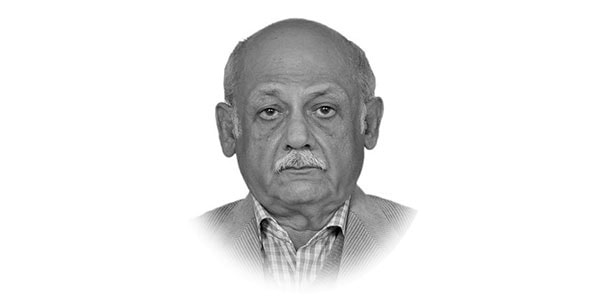Justice and judicial system
DURING the Second World War when Britain was facing the onslaught of the German air armada and the entire country seemed to be on the verge of total destruction, Winston Churchill during his tour of a bombed site in London, was asked if Britain will survive.
His answer was if British courts are dispensing justice to the common citizens today Britain will emerge victorious from this war.
It is an undisputed fact that a strong judicial system, an impartial and independent judiciary is essential for stability, growth and progress of any country.
The judicial system of a country promotes confidence and patriotism in ordinary citizens and the satisfaction that they can rely on the system for speedy justice and the belief that their cases will be heard and judged impartially, fairly and without any external pressure or political consideration.
Any judicial judgment must be reached on the basis of proof, evidence and statements of the witnesses only then courts can discharge their constitutional obligations and the Pakistani Judiciary seems to be struggling to achieve the desired results while upholding the Constitution and rights of the common citizen.
In the turbulent and checkered political history of Pakistan, the judiciary has faced many crises and continues to preserve its status as a beacon of hope for the people of Pakistan.
The national judiciary has played a pivotal role in the evolution of democracy in the country.
Many attempts have been made in the past to undermine the power and mandate of the judiciary and it continues to face criticism and abuse from many sides.
In any democratic system the role of the Judiciary is vital and essential to maintain the balance of power between the various pillars of state and to uphold the system of checks and balances.
Judiciary in Pakistan continues to grow stronger with time and the superior judges continue to enforce the power and awe of the judicial system.
The majesty and awe of a strong judiciary was made evident recently when Justice Qazi Faez Isa faced false and concocted reference due to political considerations by the powers that be and this vindictive action of the government was thrown out by the superior judiciary.
Faez Isa was honourably acquitted and continues to do his job on the bench and his accusers have been shamed.
Recent political developments and upheavals in the country have proved once again that even the judiciary is no longer the institution that commands the respect and support of the people and even the integrity, honesty and independence of the judiciary have been the subject of debate and controversy.
The role of the Apex Court and the superior judiciary was most evident in the recent removal of the Imran Khan regime.
The Supreme Court forced Imran Khan to act in a constitutional manner and face a parliamentary no-confidence motion tabled by the combined opposition.
This momentous decision by the Supreme Court divided and polarized public opinion in the country, some thought that the court order protected the constitution while others were openly critical and dubbed the order as a judicial coup.
Pakistan today is in the vicious grip of a political, economic and judicial crises and today even the superior judiciary is being questioned and criticized for some recent decisions and it appears that the judiciary and the judicial system is caught in the middle of an ugly political power game.
Ironically the other two pillars of state that is the executive and the legislature are in a state of near paralysis so the recent controversy about the role of the judiciary could lead to a complete collapse of the system with fatal consequences for the country.
As predicted by political pundits, the Supreme Court struck down the election of Hamza Sharif as illegal and declared Pervez Elahi the Chief Minister of Punjab.
This ruling came as a rude shock for the ruling parties and jubilation for the PTI but the result was an increase in the political crisis and further polarization of society.
The political crisis is getting more serious and ugly and the Apex Court is now a venue for political gladiators in battle for power and political offices.
All stakeholders and political aspirants want intercession of the Supreme Court in disputes that should have been settled in Parliament.
In this atmosphere of highly charged political disputes, it is impossible for the court to arbitrate on sensitive political and constitutional matters to the satisfaction of all concerned.
Judicial activism by some judges has added to the controversy about the judiciary.
Overstepping the role of the judiciary and encroaching on the domain of the legislature or the executive has resulted in a dangerous imbalance in society.
An attempt to rewrite the Constitution instead of sticking to the interpretation of the law has created serious doubts about the credibility and fairness of the superior judiciary.
In this worsening political polarization, it is imperative that the judiciary must stand up to the pressures of the vested political interests because sign of bowing down to pressure is extremely damaging for the democratic process and the rule of law.
—The writer is Professor of History, based in Islamabad.










